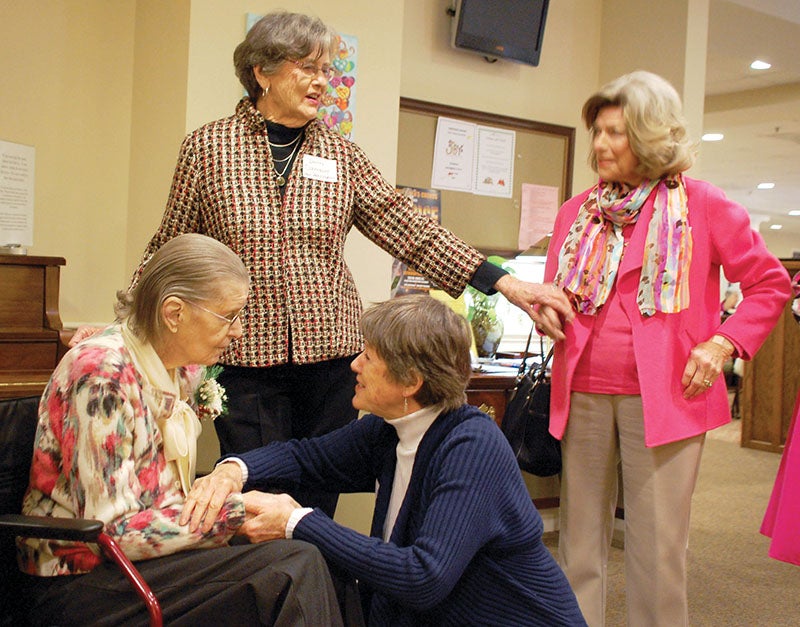Mary Messinger remembered as ‘mother of Salisbury Symphony’
Published 12:05 am Saturday, July 8, 2017

- Mary Messinger, left, speaks with Jean Owen, kneeling, at Trinity Oaks in December 2016. In the background, waiting their turn to speak with Messinger, are Dottie Clement and Alice Stanback. Salisbury Mayor Karen Alexander proclaimed the day "Mary Messinger Day" in Salisbury. Mark Wineka/Salisbury Post
By Elizabeth Cook
elizabeth.cook@salisburypost.com
SALISBURY — You won’t find many photos of Mary Messinger when you look through the Salisbury Post archive’s files for the Salisbury Symphony.
But she was a constant presence behind the scenes — helping to form, support and enlarge the Salisbury Symphony Orchestra — virtually from the beginning.
One photo from 1969 shows her standing with Livingstone College President George Shipman and director Albert Chaffoo, posing for a story on the symphony’s third season. Messinger was president of the symphony board; Shipman was vice president.
The symphony started as a joint project of Livingstone and Catawba colleges.
Last December, the Symphony Guild honored Messinger at a luncheon to celebrate her lifelong contributions. “If it wasn’t for you,” guild member Lyndia Heward told Messinger, “we wouldn’t have a symphony guild.”
“If it wasn’t for me,” Messinger said in her direct style, “we wouldn’t have a symphony period.”
Messinger, who died Monday at the age of 93, was active on many fronts in her lifetime — the Republican Party, Catawba College, the Heart Association, St. Luke’s Episcopal Church and more.
Gov. Jim Martin appointed her to the Tryon Palace Commission. In 1999, she was elected to the N.C. Republican Party’s Hall of Fame.
Through it all, her symphony involvement went above and beyond.
“Mary Messinger was very much the mother of the Salisbury Symphony Orchestra,” said John Brincefield, the symphony’s current board chairman. “She helped give us life as a mother would, fought for us as a mother would, led us as a mother would, supported us as a mother would, and loved us with the passion only a mother could muster.”
It was unusual for a city of Salisbury’s size to have a symphony orchestra in the 1960s, as it still is today.
“Without Mary Messinger, this unique organization, a pride of Salisbury and beacon of great music throughout the region, would not exist as it does today,” Brincefield said in a Salisbury Symphony news release.
Her influence will be felt for seasons to come, he said.
Maestro David Hagy said he quickly learned after moving to Salisbury in 1988 that the Messingers were key supporters of local arts groups, and that Mary had played a pivotal role for the orchestra and the guild from the beginning.
“Her constant attendance, advice and donations proved both her desire to see the organization succeed and her sincere interest in the music,” Hagy said.
“When my mom moved to the Trinity Oaks Senior Community, Mary not only welcomed her but made her a friend,” he said.
He mentioned seeing Messinger at the Mary Messinger Day celebration held in December.
“She had lost much of her sight and some hearing, but she was still the strong person who had become the matriarch of the symphony and an example to all women in the community showing what they could achieve,” Hagy said.
He saw her again just last month.
“At the beginning of June, she sat at our concert at Trinity Oaks rooting on both me and the orchestra (even during the music occasionally!). I will miss her strength, support, enthusiasm, and most of all friendship!”
A memorial service will be held at 3 p.m. Sunday at St. Luke’s Episcopal Church. The family will receive friends after the service.





